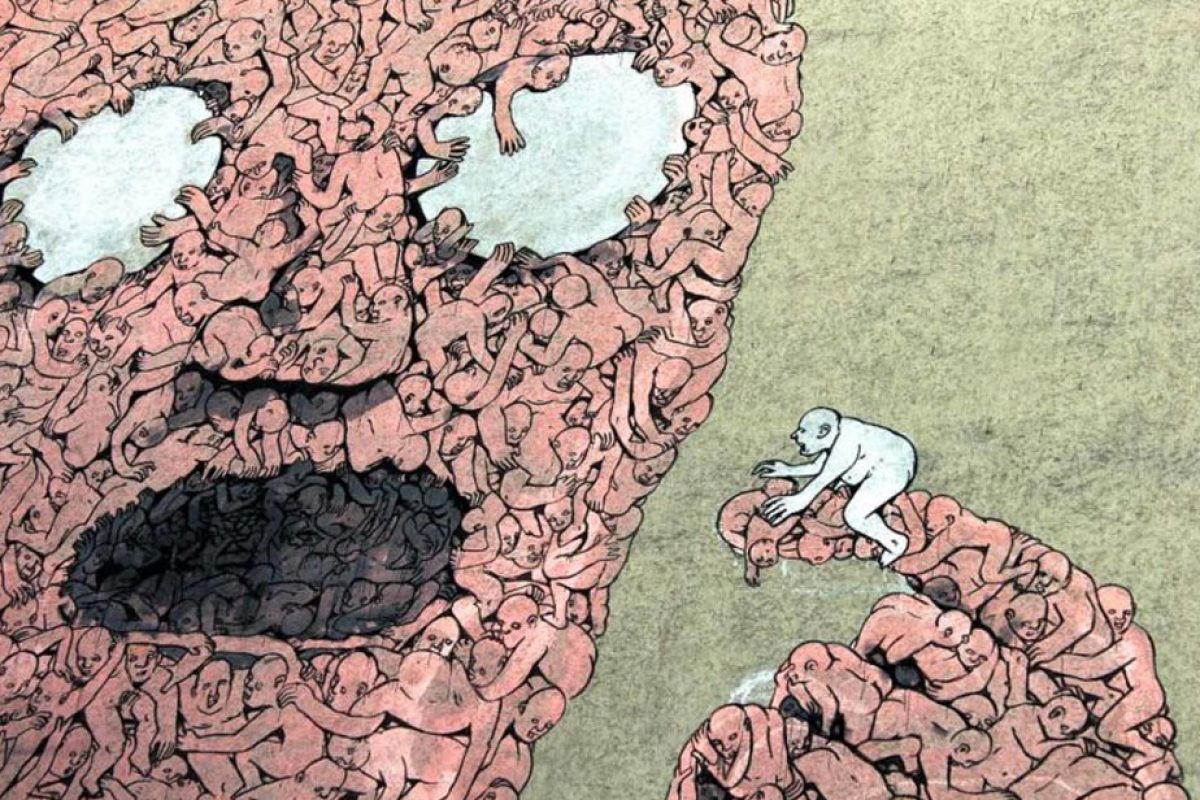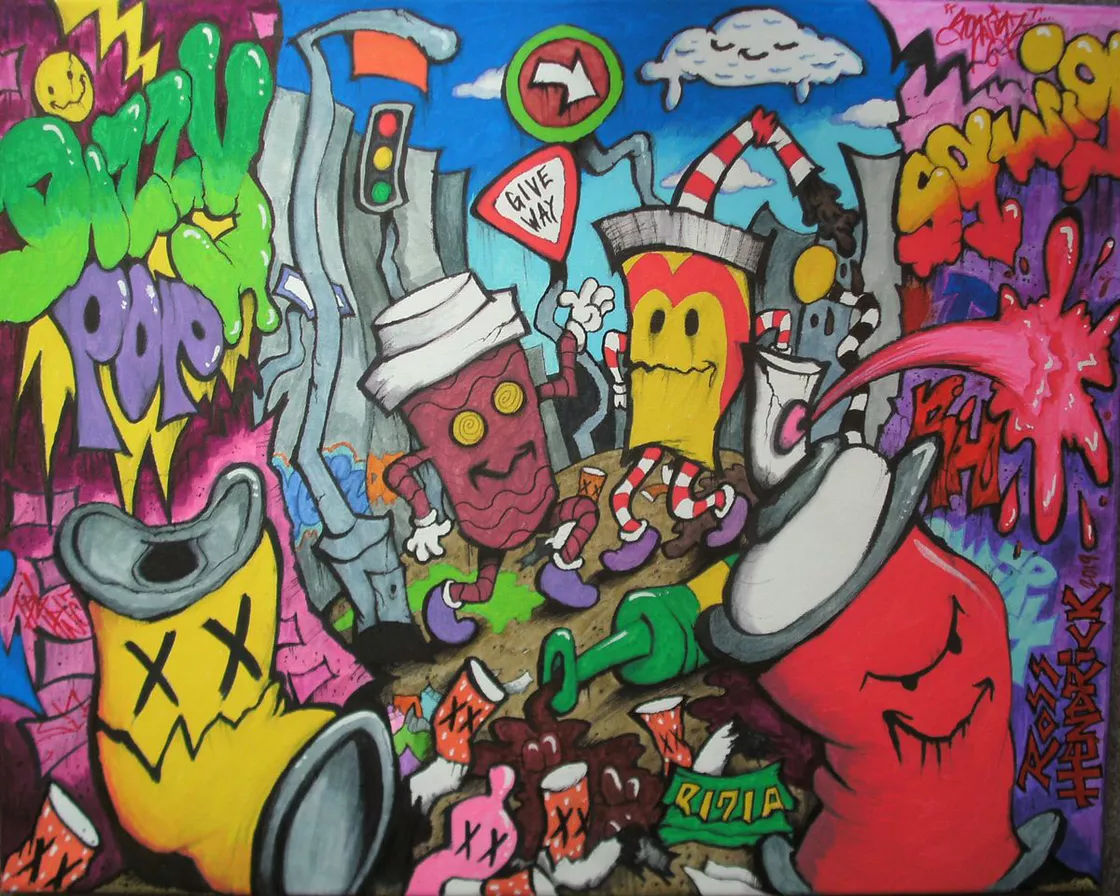‘Empty doing’, as the name implies, is ‘doing for the sake of doing’, or ‘doing that is carried out just to pass the time,’ or ‘activity that is prescribed just for the sake of filling the space’. An example of this might be when all the cups and saucers in the kitchen cupboard have already been washed and dried but I take them down all over again to wash and dry them all over again just for something to do. It’s ‘doing’ to be sure – we can’t argue about that – but it is empty doing. It means nothing.
‘Let’s do the thing, let’s do the thing because the thing is good…’ we say, full of energy and enthusiasm. The act of being enthusiastic in this way about doing the thing (whatever that might be) is also the act of taking zero interest in the question as to why we should be doing it and for this reason we can say that a goal-orientated culture is necessarily a deeply superficial one. The less we question our goals the more excited we can get about them and the more excited we become about them the more thrilling the ride is for us. Our lack of questioning (or lack of curiosity) pays off for us in this way. In a very narrow way, therefore, we actually benefit from being stupid. If we were to philosophically investigate our goals then we would straightaway see that they’re only important to us because we have said that they shall be.
This is the secret to ‘Living in the World that is made-up of Assigned Meaning’ – the meaning has to be assigned in the first place since otherwise there would be no Projected World; once we have assigned the meaning however then we are obliged to immediately distance ourselves from the fact that we have done so. We’re obliged to do something and then pay zero attention to the fact that we have done it, which is the principle referred to in Berger and Luckman’s classic work in sociology The Social Construction of Reality. It also corresponds to James Carse’s Principle of Self-Veiling, which states that if we want to play a finite game then we first have to veil from ourselves the essential freedom that we have not to play. Once we adapt ourselves to the game (so that it becomes functionally equivalent to ‘the Whole of Everything’) we are compelled to play it in other words – we’re compelled to play it because ‘the finite game has become the world’, so what else can we do? Games are a ‘compulsive environment’, they are ‘tyrannical’ in nature, whilst reality isn’t compulsory, and so when we replace the latter with the former we completely lose sight of what the word ‘freedom’ actually means. It no longer figures in our worldview…
Freedom is the thing we absolutely have to get rid of if we wish to spend our time safely playing finite games, therefore. The lack of rules (or lack of compulsivity) is the problem that needs to be hygienically eliminated. We do this via the Two-Step Procedure of Reification: first we decide to set up a bunch of rules and then we immediately claim that we didn’t decide upon the rules of the game ourselves but rather that we found them there. This happens automatically – we’re able to continue play without ever noticing that we’ve given all our freedom away because of the way in which we have tacitly defined the freedom we have ‘not to play the game’ (which is intrinsic freedom) with ‘the freedom we have to strive towards the stated goal’ (which we can call extrinsic freedom). This substitution happens automatically, as we have just said, just as soon as we identify with the compulsion (or rule) that is driving the game. When we identify with the rule that specifies what the outcome of our behaviour should be then the rule becomes ‘what I want’ and so if I say (for example) – ‘I want to win’ what I’m doing here is that I’m ‘redefining freedom in terms of attaining the goal that has been set for me by some random mechanical authority’ and this is – therefore – a perfect inversion of what is meant by the word ‘freedom’.
I am ‘redefining freedom in terms of reaching the goal that has been set for me’ and – in addition – I’m not paying attention to the fact that I myself have set it (or agreed with it) and this gives rise to a very peculiar situation – the very peculiar situation being that we originally had freedom which we gave away and replaced with a nominal form of ‘freedom’ which is actually slavery in disguise. To put this in terms of games – first I agree to a bunch of rules (where no freedom exists) and then I say that these rules represent ‘what I personally want’; I say that the rules of the game represent my actual bona fide volition, which means that I’m free after all, even though I’m not. According to the game ‘I am free to play the game’ (and so I am ‘free’) but since I can only play the game by giving away my freedom, what I’ve actually gained as a result of this is the illusion of freedom – it’s the analogue of freedom rather than the real thing. I’m free to believe that what the game tells me is true even though it isn’t, therefore. What’s really happening here is that I’ve have tied myself up in a very tight knot trying to do an impossible thing (i.e., convert rules into freedom) and the more I try to extricate myself from the pain I’m in then – in finger-trap style – the tighter the knot gets.
‘Empty doing’ is what we engage in when we’re operating purely on the level of the nominal reality, which is ‘reality as it has been arbitrarily defined by us’. Nominal reality is the world that is made-up of names (or labels) therefore – it is the Literal Realm where things can only be what they are said to be. Empty doing is the only type of doing that is possible in the Literal Realm since the nominal reality has no depth. How could the nominal reality have depth, seeing as how ‘it is only what we say it is’? This is an absolute guarantee of meaninglessness… We already know everything there is to know about the World of Extrinsic Meaning – we can’t help knowing everything there is to know about it seeing as how we made it in the first place! In order for there to be actual depth to this artificial world there would have to be something in it that we don’t know about and there isn’t.
We can’t have meaningful activity in the Literal Realm of our thoughts therefore. We can’t ever have meaningful activity, or meaningful doing, because meaning is depth – there is no other meaning in the world other than ‘the meaning that is depth’, the meaning of ‘going beyond what we already know about’ (or rather that we think we know about). What we have to do in order to make a go of the theatrical life therefore is pretend that what we’re doing is meaningful and then pretend that we’re not pretending. This is the ‘theatrical life’ in a nutshell – it’s a fiction we have to keep breathing life into. This explains why we so very prickly about our beliefs – we’re prickly and reactive because we don’t really believe what we say we believe. If we were genuine in saying that we believe this, that or the other, then we wouldn’t have to be so viciously reactive; we could afford not to be defensive in this case – we would then be able to be tolerant and peaceful when our viewpoint is challenged. We wouldn’t have to be so toxic, so vindicative and so aggressive the whole time; we wouldn’t have to be constantly struggling to prove ourselves.
‘Doing for the sake of doing’ is always insincere (or fake) and because of this it needs to be constantly hyped up. It’s only good to the extent that we talk it up, just as it’s only bad to the extent that we keep telling ourselves it is. Really, it’s not anything – we breathe life into the dead and rusty machinery of it all with our passion for the glittery illusions that are created by the game. Empty doing is always going to be rather flat – naturally enough! – and so our job is to keep ‘spicing it up’; the mechanical world will run down and come to a stand-still unless it is constantly wound up. This is more than just a little bit similar to the situation where we are having an argument with a friend and we can’t help fuelling the fire even though we know we shouldn’t. In the case of ‘doing for the sake of doing’ we keep the drama going because on some deep level we know that we will come face to face with the Nullity otherwise, and we have no appetite for that. Very few of us have an appetite from encountering the Nullity face-on!
The self-contradiction in our goal-orientated activity – as James Carse says – is that we don’t take any joy in what we’re doing and would dearly love to bring it to an end. It’s only ‘a means to an end’, after all, and so we entertain the illusion that something good or something wonderful is going to come about as a result of it, which is a basic fallacy since nothing good or real (or anything else) is ever going come out about as a result of empty doing! The reason we keep on playing (the reason we keep turning the handle of the finite game around and around) is – as we have just said – because we want to bring it to an end and acquire the prize (whatever that might be) that awaits us at the other end of the rainbow; this is what we’re really interested in. The contradiction is therefore that we think we are continuing the play in order to end the play whilst what we’re really doing is ‘continuing the game’. Playing the game doesn’t end the game, it perpetuates it. Empty doing – despite being empty- goes on and on forever therefore – it’s a perpetual motion machine. It either goes on forever or it goes on until we lose our appetite for the cheap illusory prizes that the machinery of the game keeps dangling temptingly in front of our noses. ‘Losing our appetite for the goals that drive us is the same thing’ as ‘losing our appetite for fooling ourselves the whole time’. We of course – from our conditioned way of seeing things – regard the phenomenon whereby we lose interest in our beloved goals (which are the things that drive us) as being entirely pathological and we call it ‘being depressed’…
Image – peakpx.com







Stefan
this ’empty doing’ seems to be quite the opposite of non-doing (wu wei)
zippypinhead1
Yes – all show and no content versus all content and no show, kind of thing! We all go for the wrapping paper but no content because we’re mad about wrapping paper! Who needs content, anyway?
zippypinhead1
‘Content creators’ is a real buzz word on the internet but it’s really only the packaging we care about. Actual content would be highly dangerous….
Stefan
👏👏👏